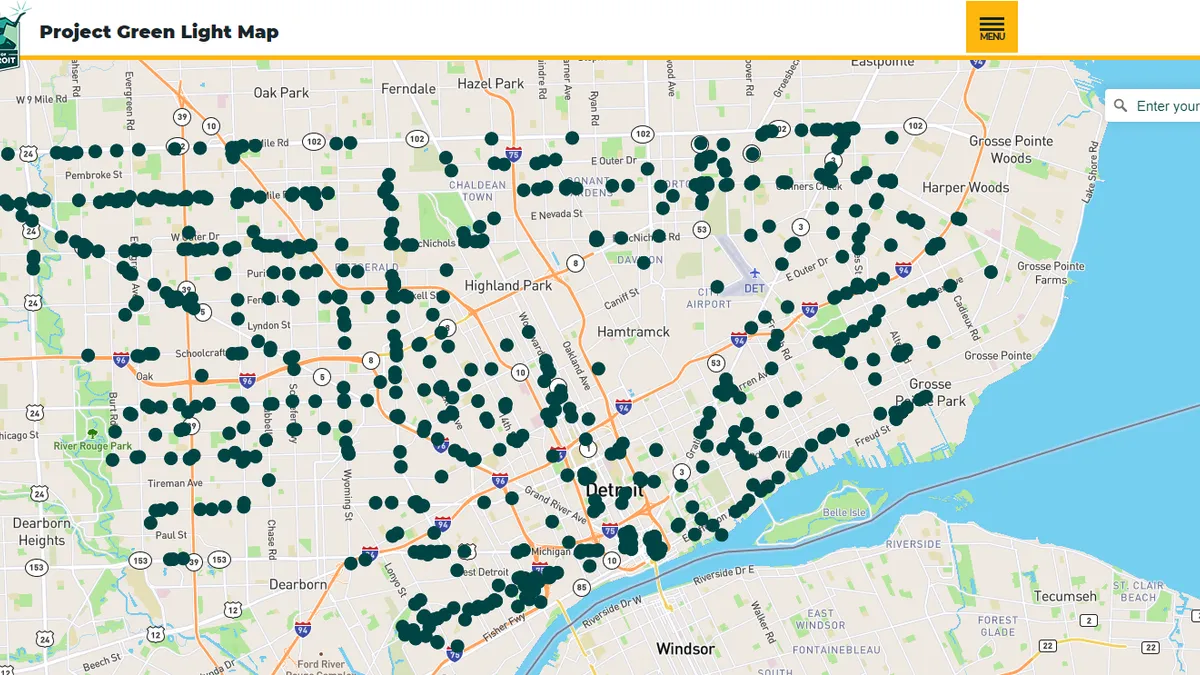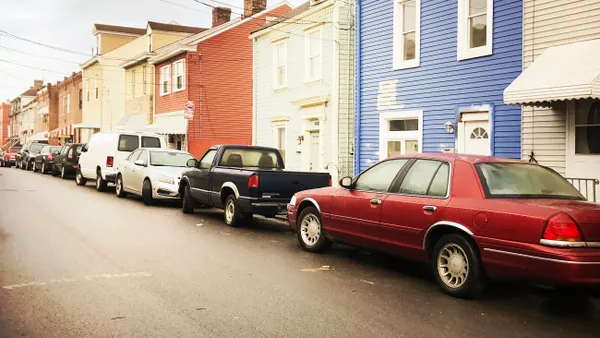Editor's Note: The following is an excerpt from Episode 2 of City Surveillance Watch, a limited podcast series from Smart Cities Dive. Follow along with the audio below, beginning at 20:24.
In 2019, activists from the group Black Youth Project 100 descended on a busy Detroit coffee shop. They carried signs and chanted, and encouraged people waiting in line for their lattes to urge their city officials to dismantle Project Green Light, Detroit’s public-private surveillance camera network program.
Project Green Light launched in 2016 at eight Detroit gas stations. The city found that in the first half of 2015, approximately 25% of violent crimes in Detroit reported overnight took place within 500 feet of a gas station. So, they created Project Green Light in the hopes of improving neighborhood safety and growing local business.
The program has grown exponentially. As of January 1, 733 Detroit locations have installed Project Green Light cameras, a Detroit Police spokesperson tells City Surveillance Watch. These cameras are installed inside and outside liquor stores, gas stations, and restaurants – and, even apartment buildings, motels, healthcare facilities and places of worship.
To participate, businesses own and operate connected surveillance cameras that stream video footage into Detroit’s Real Time Crime Center. Detroit has allocated at least $12 million since 2019 to that crime center, according to the Detroit Free Press.
Oh, and yes, there are literal flashing green lights stationed outside participating businesses that the businesses themselves have to pay for — along with signs, cameras, and connectivity services. But the ‘Green Light’ name, it has another connotation: speedier police response.
In exchange for partnering with the police program, calls for service at participating business locations are categorized as "priority 1", sometimes resulting in quicker response time to 911 calls. Many – including some local businesses and the American Civil Liberties Union – argue the program amounts to a private partnership form of public safety pay-to-play.
Lifelong Detroiter Raysh Phillips — a former fundraising chair for Black Youth Project 100 or BYP 100, that group that protested at the coffeeshop — says the cameras are invasive and seem ever present.
"Yeah, they’re very invasive. You see them all along – at, literally almost every major business and it really just feels like you have eyes on you at all, like 24-7. No matter what you do, someone’s watching you," Phillips said.
Phillips also worries that the city is profiling people captured through Green Light cameras. In fact, there’s plenty of concern that Detroit could use its facial recognition software in conjunction with Green Light camera footage to identify people in real-time.
The Detroit Police Department does use face recognition software from DataWorks Plus, a technology used in conjunction with still photos from Project Green Light cameras. NBC News reported in 2019 that Detroit Police used face recognition in a homicide case to identify a still image of a suspect picked up from a Green Light camera.
But Detroit Mayor Mike Duggan in 2019 said on Twitter that Detroit PD would not use facial recognition software in real-time with live stream video.
Regardless, there has been high-profile media coverage of wrongful arrests resulting from Detroit PD’s use of the DataWorks Plus technology. After using the facial recognition, Detroit police misidentified suspects which led to false arrests of two Black men in 2019 and 2020.
Still, despite vocal opposition within the city and among civil liberties activists around the country, Detroit in September extended its facial recognition software contract with DataWorks Plus, agreeing to pay an additional $220,000 on top of the $1 million the city agreed to pay the company in 2017.
Hungry for more? Episode 3 of City Surveillance Watch drops on Feb. 8. Subscribe today on Apple Podcasts, Spotify, Stitcher or wherever you listen to podcasts.











